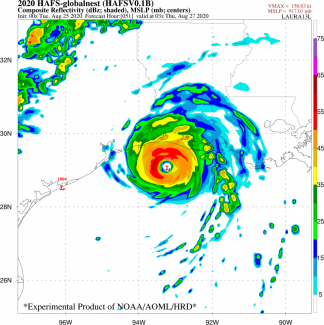The Hurricane Analysis and Prediction System (HAFS) v1 has been approved for operational implementation for the 2023 hurricane season by NOAA NCEP and, with it, the Common Community Physics Package (CCPP) will be deployed operationally for the first time. This is a major milestone for this software infrastructure. The first set of requirements for the CCPP was established in 2017, following numerous discussions by the Physics Interoperability Team, which was assembled under the auspices of the Earth System Prediction Capability (ESPC, now Interagency Council for Advancing Meteorological Services [ICAMS]).
Over the last six years, the CCPP was established with two major components: the CCPP Physics, a library of physical parameterizations, and the CCPP Framework, the infrastructure that connects the library to host models. The Framework has undergone extensive development to meet the needs of the research and operational communities. One example is the static build, in which a number of suites can be provided at compile time, resulting in the auto-generation of suite-specific physics interfaces to the model (called caps), to be included inside of the model executable. This approach gives the flexibility required by the research and development community (by providing the ability to choose a menu of suites at runtime), while being efficient in computational memory use and timing.
The benefits of the CCPP go beyond those provided by the Framework. The CCPP Physics contains a number of physical parameterizations that can be assembled into suites. This approach enabled the UFS Hurricane Application team to experiment with different designs for HAFS, finally settling on two configurations to satisfy the needs of the National Hurricane Center (NHC). The physics suites for these two HAFS implementations apply different physics suite configurations: HAFS-A uses the GFDL single-moment microphysics and HAFS-B uses the Thompson double-moment microphysics. The configurations also differ in customizations to the convective and planetary boundary layer (PBL) schemes and in the frequency of calls to the radiation parameterization.
The DTC Visitor Program also played an important role in supporting the community engagement with the development of physics for HAFS. Dr. Andrew Hazelton, from the University of Miami Cooperative Institute of Marine and Atmospheric Science (CIMAS) and affiliated with NOAA’s Atlantic & Oceanographic Meteorological Laboratory, was the recipient of a DTC award for the improvement of PBL representation for better forecasts of tropical cyclone structure and large-scale steering (see Winter 2023 DTC Newsletter).
The DTC is responsible for the code management of the CCPP repositories, and co-manages the UFS fork of CCPP Physics in Github. This fork, which is used by those contributing physics intended for the UFS, is directly connected to the UFS Weather Model and used in all UFS Applications. The DTC reviews git repository pull requests for bug fixes and innovations, and connects with experts to obtain additional input. The DTC also represents the CCPP component on the UFS Weather Model code management team, ensuring that changes in CCPP are well coordinated with the rest of the model. Physics contributions from the community, such as those from Dr. Hazelton, are critical to improving the UFS skill. Given the distributed nature of the UFS development, with contributions from the NOAA Weather Service and Research Laboratories, as well as NCAR and academia, a robust code management strategy is critical to foster collaborations while maintaining agility.
In summary, the CCPP has come a long way since its inception, laid a strong foundation for research and development (R&D) and transitions, and achieved readiness to support operational implementations of the UFS Weather Model and its applications. We are looking forward to seeing HAFS v1 go live and contributing to the suite of models used by the NHC to create its forecasts.
For more news related to CCPP, see the Community Connections article: A Forward-looking Virtual Get-together of the CCPP Community.
